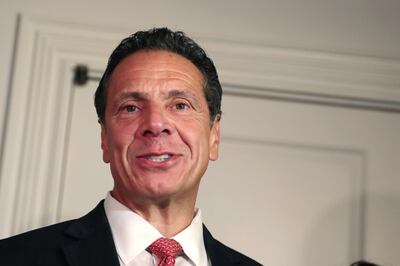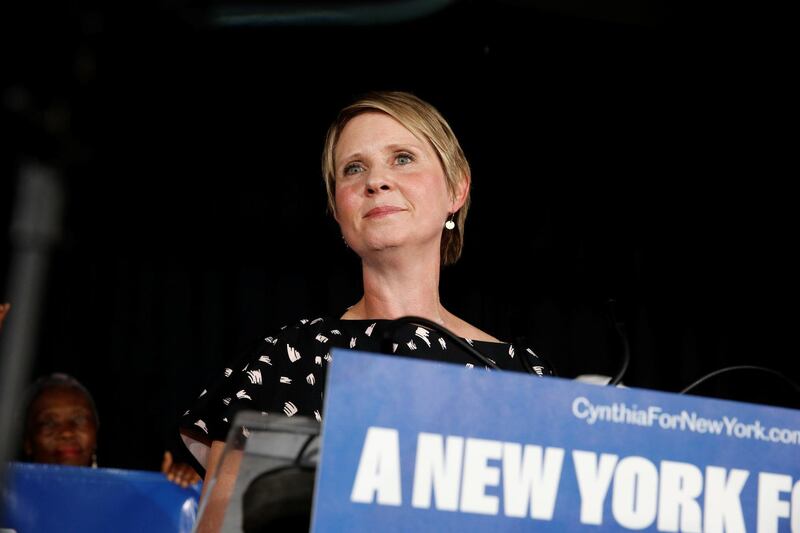New York Governor Andrew Cuomo won the state’s Democratic gubernatorial nomination, beating actress Cynthia Nixon in an election that tested his ability to counter a progressive challenge in one of the nation’s most liberal states.
With more winning about 65 per cent of the votes, Nixon conceded the race on Thursday night, but declared a victory in the ousting of several Democratic state senators who had aligned themselves with Republicans to thwart the progressive agenda.
“The blue wave is real and it is not only coming for Republicans, it’s coming for Democrats who act like them,” she said. “The other side spent $25 million trying to drown us out but we wouldn’t back down, we refused to be quiet and we made our voices heard.”
Nixon, who starred in the HBO series Sex and the City, tried to depict Mr Cuomo as ineffective in maintaining the state's infrastructure and school systems and as a corrupt captive of corporate campaign donors. Mr Cuomo, 60, largely ignored Nixon and campaigned asserting that he would be the better adversary to President Donald Trump, a fellow New Yorker who is unpopular in the fourth most-populous US state.
Democrats responded to Mr Cuomo’s stance as Mr Trump’s antagonist in chief, with more than 1 million votes cast, which would extrapolate to a turnout of more than 20 per cent. The primary campaign four years ago attracted a total of about 575,000 voters.
While Nixon failed to oust the two-term incumbent, her criticisms of Mr Cuomo may be raised by Republican candidate Marc Molinaro, the executive of upstate Dutchess County, in the November 6 election. They may also make Mr Cuomo vulnerable if he decides to run for president in 2020, even though during the campaign he promised to serve until 2022 if re-elected.
“In a large free-for-all field that is likely in 2020, perhaps even as big as the GOP’s in 2016, he could have as good a shot as anyone else in the category of the more-moderate wing of the party,” said Robert Shapiro, professor of political science at Columbia University. “If he were the candidate, his battles with Nixon and Teachout and his late coming with liberal initiatives might cause problems in getting the progressive base."

Zephyr Teachout, a law professor and anti-corruption activist, lost a four-way race for the Democratic nomination for New York attorney general, even after receiving endorsements from the New York Times and other newspapers. Letitia James, the city's public advocate, won with 42 per cent of the vote, while Ms Teachout came in second with 31 per cent, with 77 per cent of precincts reporting, according to the Associated Press.
While Mr Cuomo also was endorsed by the Times, the paper had many harsh words for the incumbent, called him a "flawed" governor who "has done little to combat the corruption in the legislature and his own administration, and he has allowed the subway system, the foundation of the New York City economy, to rot".
The race for lieutenant governor was was won by Mr Cuomo’s running mate, incumbent Kathy Hochul, who defeated a strong challenge from Nixon’s partner, black city councilman Jumaane Williams.
Mr Cuomo’s victory ran counter to results in several other elections this year in which insurgents defeated incumbents or establishment-backed candidates.
Nixon, 52, had hoped to take advantage of the Democratic Party’s leftward shift, attacking Mr Cuomo for accepting millions of dollars from property developers and other corporate interests, and for failing to stem corruption that has resulted in federal convictions of state legislative leaders and three former top aides.
“She has not inspired widespread confidence that she can run a state government,” George Arzt, a Democratic political consultant who was press secretary to former New York City Mayor Ed Koch, said ahead of the vote. “Meanwhile, he has the people in state jobs, the people dependent upon government services, the vendors, the contractors. That’s a very committed group, and they are going to come out to vote no matter what the weather is.”
_______________
Read more: From prime-time to politics: what Cynthia Nixon did next
_______________
Nixon was also no match for Mr Cuomo’s prodigious fundraising ability. He raised more than $35 million, with the largest amount coming from the real estate industry. Nixon, who vowed to take no corporate money, raised $2m.
Mr Cuomo, the son of three-term governor Mario Cuomo, prevailed despite a campaign marked by gaffes, miscalculations and offensive statements. Most recently, a mailing sent by the Cuomo-controlled Democratic State Committee stirred outrage by suggesting that Nixon would tolerate antisemitism. Nixon belongs to a Manhattan synagogue and has raised her children as Jewish.
Earlier in the campaign, Mr Cuomo joked to a black church congregation that Jews cannot dance, lectured a woman reporter on sexual harassment and urged another to let him watch her eat a sausage sandwich. Last month, he provoked gasps among an audience of supporters by trying to deflate Mr Trump’s slogan by saying America “was never that great”.
Mr Molinaro, 42, who ran unopposed, has already attacked Mr Cuomo’s stewardship of the state-operated subways and characterized his leadership as scandal-ridden. In a state where Democrats outnumber Republicans more than 2-to-1, Mr Molinaro’s victory would make him the state’s first Republican governor since George Pataki ended his term in 2006.






